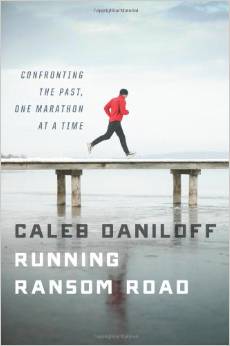We’ve recently discovered Caleb Daniloff, a writer who uses running as a tool in his recovery. A few years ago, he set out to run marathons in all of the cities that once defined him as a drunk. After completing four marathons and three races over 18 months, he wrote a book chronicling the journey through confronting his past. He no longer runs from his problems but with them, confronting them on a regular basis. We are thrilled to have found him and delighted he was willing to answer a few questions.
What made you choose running as a means of confronting your past?
In a way, running chose me. I never set out to be a runner. And I didn’t start pursuing fitness until a couple years into sobriety. I’d put on some 25 pounds and was distressed at how fat and out of shape I’d become. So it was vanity that first pushed me down the fitness track. I started by swimming a few laps at the town pool, which just about gave me a heart attack. But I kept at it and joined a gym. After a while I developed a persistent ear infection which was making swimming difficult so I tried the rowing machine and then the treadmill. And something about the exertion and the forward motion clicked for me. Running eventually opened up a psychological and emotional terrain where I could look at myself and my past in a pure and honest way and begin figuring out a true way forward through sobriety. It’s hard to be fake with yourself in the face of the energy that running requires. It was only years later that I decided to try a marathon, thinking it’d be a one-off. But I became intrigued by the idea of multiplying my regular run, which had become such a healing agent and sobriety tool, by four or five times and setting it against the backdrop of places that shaped me as a drinker and as a person. I wanted to try and reconnect with those parts of my past that had pushed me down the dark road of alcoholism. For a long time, I never understood why me.
How has running helped you in recovery?
When you quit drinking and drugging, there’s a void that’s left behind and it needs to be filled. Running was a great fill. Sobriety can be a confusing, depressing, angry, shame- and guilt-filled time and the solitude and momentum of running helped soften the experience; it brought progress, confidence, forward motion, and later a sense of joy back into my life. For years, I had been a pretty joyless character. Running allowed me to see with new eyes, to figure how to reconcile with my past, how to reach out to those I’d harmed. It gave me a purer space to get to know myself again.
What do you think about while you’re out there running?
Everything and nothing. Sometimes I completely zone out in the repetitive rhythm of my pounding feet and swinging arms and forget that I’m even running. Other times, I parse over stubborn problems and am able to see them in a new way. Sometimes, images and lines and insights bubble up. Some runners call the pavement beneath their feet the best and cheapest therapist around. You never really know where your mind will go, but I usually return home renewed on some level. It can feel very spiritual.
Would you recommend running to others in recovery?
Yes. And it’s easy to get started. There are plenty of runners, marathoners, and ultra-marathoners who have a history of addiction. It’s less about replacing addictions as one might think, but rather about replacing one unabiding passion for another, filling that hole.
What advice can you give to people struggling addiction?
It’s hard to advise people actively struggling with addiction on the best way forward. Quitting is such a personal and difficult action, no one can force you into it. You do get tired of the losses, the deceptions, the ruin. It gets exhausting. But when you get sober, you need some sort of process or system to keep you steady and moving forward. For some people, that’s AA or another 12-step program. In any case, I do believe some sort of spiritual conversion is necessary. Not necessarily finding God or a higher power, but finding humility and your humanity and recognizing the significance of your place in the world, in your community, and among other people. Simply rejoining the human race can feel like a spiritual conversion.
Even after you finished the marathons you set out to complete, do you still run regularly?
I do. Between 30 and 40 miles a week. I try and run one marathon a year now, just to stay in touch. While I remain a solo runner, the running community is a very welcoming and supportive one. I also do yoga, which very much has a spiritual element and the mind-body connection.
What are your future plans?
As for running, I’ll be toeing the line at the Philadelphia Marathon in a couple weeks and hope to run Boston again in 2013. In other areas, I’ll continue to write and enjoy my family and try and live a conscious and, hopefully, evolving life. ————————————————————————————————————————————————- Thank you, Caleb! Check out Caleb’s book Running Ransom Road: Confronting the Past, One Marathon at a Time and his website.

